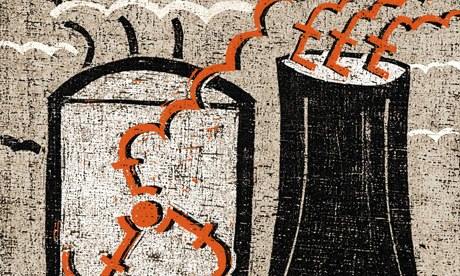
Illustration by Daniel Pudles
Seven years ago, I collected all the available cost estimates for nuclear power. The US Nuclear Energy Institute suggested a penny a kilowatt hour. The Royal Academy of Engineering confidently predicted 2.3p. The British government announced that in 2020 the price would be between 3 and 4p. The New Economics Foundation guessed that it could beanywhere between 3.4 and 8.3p; 8.3 pence was so far beyond what anyone else forecast that I treated it as scarcely credible. It falls a penny short of the price now agreed by the British government.
I still support nuclear power. I believe that to abandon our primary source of low carbon energy during a climate change crisis would be madness. It would mean replacing atomic plants with something much worse.
We should, of course, cut our profligate demand for power as much as possible. But if transport and heating are to be powered by low-carbon electricity, total demand is likely to rise even with the most parsimonious use of energy.
And we should make as much use as we can of renewables. But the biggest onshore wind schemes could supply only a fraction of the low-carbon power a nuclear plant can produce. For example, the controversial deployment in mid-Wales would generate just one 14th of the proposed output of Hinkley C. Offshore wind has greater potential, but using it to displace most of our fossil fuel generation is a tough call, even when it's balanced with a nuclear power baseload. Without that you would explore the limits of feasibility. If every square metre of south facing domestic roof and suitable wall in the UK were covered with solar panels, they would produce 9% of the energy currently provided by fossil fuels.
The harsh reality is that less nuclear means more gas and coal. Coal burning produces, among other toxic emissions, heavy metals, acid sulphates and particulates, which cause a wide range of heart and lung diseases. Even before you take the impacts of climate change into account, coal is likely to kill more people every week than the Chernobyl disaster has killed since 1986. It astonishes me to see people fretting about continuing leaks at Fukushima, which present a tiny health riskeven to the Japanese, while ignoring the carcinogenic pollutants being sprayed across our own country. But none of this means that we should accept nuclear power at any cost. And at Hinkley Point the cost is too high.


No comments:
Post a Comment